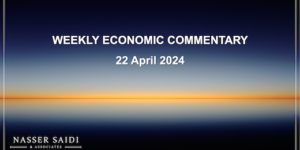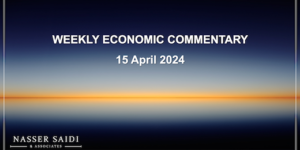Markets
Stock markets had a lackluster week in the US, as earnings by large corporates such as Intel and GE disappointed expectations. Meanwhile, the CBOE VIX equity volatility index, dubbed Wall Street’s “fear gauge”, was down more than 8 points. European stocks rallied for the second week on expectations of an improved economic outlook. Most regional markets, barring Oman and Kuwait, gained this week led by Dubai and Abu Dhabi’s as corporate earnings come in focus. The dollar rose to a four-month high as the housing market recorded its best year since 2007, while the yen plummeted after Japan posted a record current account deficit this month, and the euro touched an eight-week low. Oil prices rose on expectations of accelerating US growth and gold recorded a weekly gain.
Global Developments
US/Americas:
- US inflation was 0.3% mom in Dec, the first advance in three months. A sharp rebound in the energy component drove the headline number. The core CPI increased 0.1% mom, decelerating from 0.2% in Nov. On a yearly basis inflation jumped at 1.5% from 1.2% in Nov.
- US industrial production grew 0.3% mom in Dec vs 1.0% in Nov. For 2013 industrial output was up 6.8%. Manufacturing production grew 0.4% mom, including a 1.6% jump in motor vehicle and parts production. Excluding the auto sector, manufacturing output was up 0.4%, the third consecutive sizable monthly gain.
- US retail sales increased 0.2% mom in Dec after a 0.4% advance in Nov. For 2013, retail sales rose 4.2%, vs 5.4% in 2012. Purchases excluding auto dealers jumped 0.7%, mom the biggest gain since Feb.
- The Reuters/University of Michigan US consumer confidence index disappointed expectations decreasing from 82.5 in Dec to 80.4 in Jan, as a result of concerns by low and middle-income households over weak employment growth and minimal income improvements. Inflation expectations were little changed.
- US housing starts fell -9.8% mom in Dec to annual rate of 999k sa, exceeding expectations and remaining above summer lows. On an annual basis, housing starts increased 18.3% yoy, the strongest year since 2007. Building permits fell for the second month, slipping -3%.
- Initial US unemployment claims fell 2,000 to 326,000 with the four-week moving average down from 348,500 to 335,000. Continuing claims increased to 3,030 million, pushing the insured jobless rate up to 2.3%. The job market continues to gradually heal.
Europe:
- Eurozone industrial production rebounded strongly in Nov, rising 1.8% mom after shrinking an upwardly revised -0.8% mom in Oct. Output grew in most countries led by Germany with an increase of 2.4% and followed by France (1.4%), Spain (1%) and Italy (0.3%).
- Eurozone inflation ebbed to 0.8% yoy in Dec from 0.9% in Nov, and in all likelihood will remain moderate in coming months.
- France’s President Hollande unveiled an economic plan hinging on lower taxes for business and social security contributions. The government expects 2 million new jobs in 5 years, which is a wildly optimistic target.
- German GDP grew about 0.25% qoq in Q4 down from 0.3% in Q3. Full-year growth in 2013 was a paltry 0.4%. Growth in employment slowed “markedly” to 0.6%.
- Turkey’s current account deficit widened in Nov to USD 3,935mn from USD 2,924mn in Oct. The slide of the Lira caused by political turmoil is hitting the external balance and raising questions on the sustainability of the foreign debt.
- UK inflation declined in Dec to 2% from 2.1% in Nov, thanks to early retailers’ discounts and lower food prices. Energy bill increases and higher travel costs will limit any further downside.
- UK retail sales surged 2.6% mom in Dec, the strongest rise for the month on record – after a -0.9% mom decline in Oct and a tepid Nov.
- Domestic lending by Spanish banks fell -12.6% yoy in Nov, following a -13% in the previous month.
Asia and Pacific:
- Japanese current account deficit widened to JPY 592.8bn in Nov from JPY 127.9bn in Oct – the largest deficit on record and much higher than the 179.6bn deficit recorded the year before.
- Core machinery orders in Japan increased 9.3% and hit a five-year high in Nov, from 0.6% rise in Oct. Core private-sector machinery orders, which exclude volatile categories such as ships and utilities, grew to JPY 882.6bn.
- Consumer confidence in Japan tumbled unexpectedly in Dec. The headline sentiment index fell to 41.3, well below the neutral 50 mark. The drop was uniform across sub components except employment, which rose somewhat.
- Indian WPI inflation slowed to 6.2% yoy in Dec from Nov 7.5%. Food prices declined over the month while energy prices rose. Prices for manufactured products, a proxy for core inflation, held steady.
Bottom line: Worries about deflation are the new fad in Europe, but although prices are cooling but the catastrophe portrayed by the doomsayers is not in sight. The key issue was reiterated by IMF Director Lagarde in an article: “Too many countries face a legacy of high public and private debt, fiscal and current-account imbalances, and growth models that are unable to generate enough jobs. The international community also needs to complete the regulatory reforms required to create a safer financial system that better supports the needs of the real economy”. This kind of advice falls on deaf ears. Japan for example went in the exact opposite direction with Abenomics and the latest figures are not encouraging.
Regional Developments
- The referendum on the new Egyptian Constitution was approved with a 98.1% majority, paving the way for a normalization of the situation after the military took over. Around 53.4 million were registered to vote, but the turnout was 20.6 million (38.6%). Meanwhile, it is anticipated that the President will call for elections in March, based on statements from the first deputy to the head of the State Council.
- Egypt’s core CPI increased by 0.41% mom in Dec, almost unchanged from 0.46% mom in Nov with the annual rate stable at 11.9%.
- Egypt’s central bank left key policy rates unchanged – deposit rate at 8.25% and its lending rate at 9.25% – as the country tries to keep inflation in check while stimulating economic growth.
- Trade deficit in Egypt dropped by 33.1% yoy to EGP 12.7bn in Sep 2013 – exports value was down 8.1% yoy to EGP 15.9bn but in the first nine months of 2013 exports registered an increase of 13%, largely thanks to the depreciation of the EGP.
- The UAE will provide EGP 20bn of the EGP 30bn second stimulus package aimed towards boosting the economy in Egypt, according to the deputy PM and minister of international cooperation, with the residual EGP 10bn funded by the state. The second package includes building 50k residential units, establishing 25 wheat silos, the completion of sanitation projects, building 100 schools and the provision of 600 public buses.
- US Congress spending bill will result in Egypt receiving aid of up to US 1.3bn in military assistance, and USD 250mn in economic support for Cairo though the amounts are linked towards democracy being restored in the country.
- Unemployment rate in Jordan dropped to 11% in Q4 2013 compared to 14% in the previous quarter. Figures released by the Department of Statistics also showed that unemployment rate was 9.5% among males compared with 18.7% in females.
- Jordan’s investment recovery reflects “pre-crisis” levels, according to the acting CEO of the Jordan Investment Board, as total inflows increase by 19.5% in 2013. The volume of projects that applied to benefit from the Investment Promotion Law reached JOD 1.92bn last year compared to JOD 1.61bn in 2012.
- Kuwait’s Emir pledged USD 500mn, at an international donor conference in Kuwait, to Syrians affected by the ongoing civil war.
- The new Finance Minister in Kuwait stated that the government will continue to review its heavy spending on subsidies under the new cabinet, making sure that the subsidies are going to the “right people” and also that “there should be a decrease [in subsidies] in general but they will not be eliminated”.
- Compliance with Basel III requirements and stiff competition are leading to further consolidation in Lebanon’s banking sector as witnessed by the Lebanese banks’ bids to acquire the retail operations of Ahli International Bank, Standard Chartered and Emirates Lebanon Bank in recent weeks. The 10 leading Lebanese banks control 80% of the market, with the rest divided between medium and smaller lenders.
- Oman recorded 5.6% yoy growth in the number of nationals employed in the private sector in the year to Nov 2013. According to the Public Authority for Social Insurance, there are 181,964 Omani nationals registered in the private sector as compared to 1.52mn expatriates, the latter growing by 16% yoy over the same period.
- Qatar‘s central bank issued three and five-year conventional and Islamic government bonds last week worth QAR 24bn – the largest sale in three years – in a bid to deepen its domestic debt market ahead of the 2022 World Cup. The conventional local currency bond offering was worth QAR 13bn (QAR 8bn riyals for 3-yr maturity and QAR 5bn in 5-yr maturity) while Sukuk were split QAR 7bn (3-yr) and QAR 4bn (5-yr).
- Qatar’s CPI inflation remained unchanged mom in Dec in spite of marginal increase in rents and food price; in yoy terms, inflation was up 2.7% on rents and costlier furniture and entertainment. Excluding rents, the overall index was down 0.1% mom and up 1.9% yoy.
- About 86.5% of Saudi Arabia’s SAR 121.3bn education budget would go towards payments of the salaries of teachers and education officials, according to the deputy education minister.
- Saudi Arabia’s Ministry of Labour is preparing a comprehensive list to raise private sector wages for Saudis in the Nitaqat program; under this rule, Saudis will get SAR 4,000 instead of SAR 3,000 and SAR 6,000 instead of SAR 4,000.
- Saudi Arabia topped the list of Abu Dhabi’s non-oil commodities trade partners, with total trade at AED 18.46bn in 2012 or roughly 12.4% of Abu Dhabi’s total non-oil trade.
- Saudi Arabia, Kuwait and Bahrain have expressed willingness to set up a joint credit information center, reported Al-Sharq Al-Awsat, with its sources stating that the application of the proposed credit information exchange program could be started with two or three countries and then expanded to cover the remaining GCC countries in few years.
UAE Focus
- Reuters reported that Dubai Group had signed a USD 10bn debt restructuring deal last week – while Dubai Group declined to comment, it was revealed that its lenders, including France’s Natixis and Dubai’s Emirates NBD, still have to sign and return the last piece of documentation before the deal is finally concluded. Of the USD 10bn debt, USD 6bn is owed to banks, while the remainder involves intra-company borrowings.
- Abu Dhabi announced that foreigners can own property in the emirate on a freehold basis in designated investment zones; according to the Abu Dhabi municipality, residential units in the zones will be registered under Abu Dhabi’s freehold law, with property ownership deeds issued to investors. Prior to this, foreign investors in Abu Dhabi property were generally limited to leasehold arrangements with 99-year leases.
- Dubai Land Department data show that the total amount of property or land in the city which was sold or mortgaged surged 53% yoy to AED 236bn in 2013 while the number of property transactions grew 52% to 63,652. Total value of sales and mortgages on pieces of land increased by nearly 50% to AED 166bn in 2013 from AED 111bn in 2012.
- Foreign direct investment in the UAE is expected to grow by 20% this year to USD 14.4bn from USD 12bn in 2013, according to Abdullah Al Saleh, Under-Secretary of the UAE Ministry of Economy, Foreign Trade Sector. UNCTAD figures show that UAE is the third most attractive Arab country for FDI, with the total FDI inflow to the country also representing 48% of total GCC FDI.
- Dubai inflation was up 1.13% in 2013, as per Dubai Statistics Centre data, with prices of alcoholic beverages and tobacco and education rising the most – 14.79% and 4.58% respectively. Meanwhile, Dec CPI was up 2.21% yoy and down 0.08% mom.
- Dubai hotels reported marginal rise in Dec occupancy rates, in spite of new entrants into the market; STR Global data show occupancy grew by 1.7% yoy to 80% in Dec, with average daily rate up 7.7% to AED 1,063.32 and revenue per available room rising by 9.5% to AED 850.50.
- The Economic Report of Abu Dhabi 2013, released last week, revealed that Abu Dhabi’s nominal GDP grew 7.7% yoy to AED 911.6bn in 2012, and population registered a growth of 8% yoy to 2.3mn. FDI in Abu Dhabi rose by more than 7.8% yoy to AED 52.23bn in 2011.






